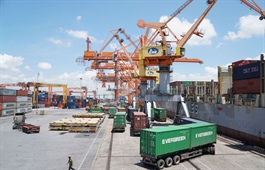Viet Nam expected to add 36 million middle class people in next decade
Viet Nam expected to add 36 million middle class people in next decade
Viet Nam is expected to add 36 million people to its middle class by 2030, according to a recent report by McKinsey.

The report “The new faces of the Vietnamese consumer” said that in the next decade, Viet Nam’s middle class was expected to continue to grow, spreading out geographically and becoming more diverse.
Powered by continued investments in its manufacturing sector, dynamic foreign direct investment and rising productivity, Viet Nam has been a consistent outperformer in Asia.
Viet Nam is well positioned to be a significant driver of the next chapter of Asia’s consumption story. Over the next decade, 36 million more consumers may join Viet Nam’s consuming class, defined as consumers who spend at least US$11 a day in purchasing power parity terms.
This is a major change. In 2000, less than 10 per cent of Viet Nam’s population were members of the consuming class, which has risen to 40 per cent today. By 2030, this figure may be close to 75 per cent.
New consumption power is emerging not only from those who have entered the consuming class for the first time, but from the consuming class’s sharp rise within the income pyramid.
The two highest tiers of the consuming class (those spending US$30 or more per day) are growing the fastest and may account for 20 per cent of Viet Nam’s population by 2030.
“Urbanisation is an important contributor to income growth. Viet Nam’s urban population is projected to surge by 10 million over the next decade as the share of the country’s urban population rises from 37 per cent in 2020 to 44 per cent by 2030," the report said.
"Cities are likely to be Viet Nam’s engine of growth, contributing roughly 90 per cent of all consumption growth over the next decade. The story of Viet Nam’s urbanisation has often been centered around the populous cities of Ha Noi and HCM City, with each city home to more than 10 million people and most of Vietnam’s middle class. However, our analysis finds that over the next decade, sources of urban consumption are likely to spread to smaller cities, including Can Tho, Da Nang and Hai Phong.”
Across Asia, households are shrinking. The size of the average Vietnamese household has decreased by around 20 per cent over the past two decades, from 4.5 people per household in 1999 to 3.5 people per household in 2019.
If the experience of other Asian markets holds true in Viet Nam, the declining size of households may lead to new types of demand, including smaller homes, increased ownership of pets and new forms of entertainment.
Viet Nam remains a young country overall, with a median age of 32 in 2020. However, the number of people aged 60 and over is projected to increase by 5 million; seniors could account for more than 17 per cent of Viet Nam’s population by 2030.
Spending by seniors is expected to triple in the next decade, growing at more than double the rate for the population as a whole.
So-called digital natives born between 1980 and 2012, including members of Generation Z and millennials, are expected to account for around 40 per cent of Viet Nam’s consumption by 2030.
Members of this digitally savvy generation live online and on their mobiles. Almost 70 per cent of Viet Nam’s population in 2020 are internet users. Rapid digitisation is changing the daily channels and communication methods used by Vietnamese people, particularly in e-commerce, where regional players, such as Shopee and Lazada, and local players such as Tiki, are active.
The rapid emergence of digital consumers has fuelled innovation in retail and purchasing behaviour.



















